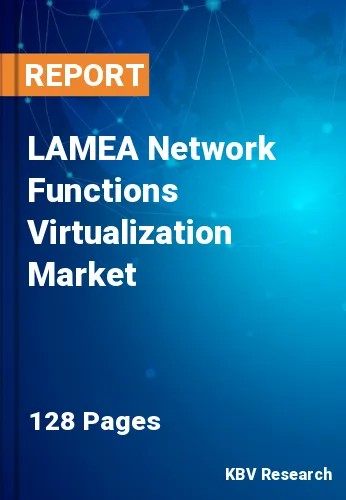The Latin America, Middle East and Africa Network Functions Virtualization Market would witness market growth of 27.9% CAGR during the forecast period (2022-2028).
A crucial part of NFV platforms, the vSwitch is in charge of establishing communication between virtual machines (VMs) as well as between VMs and external networks. Both the bandwidth of the VNFs and the affordability of NFV solutions are determined by their performance. To satisfy the demands of NFVI solutions, performance issues with the standard Open vSwitch must be fixed. For both OVS as well as Accelerated Open vSwitch versions, NFV suppliers indicate significant performance increases.
The definition, measurement, and attainment of availability in NFV solutions are evolving as a result of virtualization. A strategy that is service-based, end-to-end, and layered is replacing conventional function-dedicated equipment as VNFs take its place. Because explicit linkage with specific equipment is broken when network operations are virtualized, availability is determined by the availability of VNF services. NFV platforms should provide a wide variety of fault tolerance solutions because NFV technology can virtualize a variety of network function aspects, each with its own service availability expectations. With this flexibility, CSPs may customize their NFV solutions to any requirement for VNF availability.
The regional BFSI industry is significantly robust. Traditionally, the trade and construction industries have benefited greatly from bank loans. Due to the lack of significant investment opportunities in other productive sectors, banks lend to the trade, services, and building industries. Moreover, the BFSI sector of the UAE contributes a significant proportion of the GDP of the country. In addition, according to the Export Government, the four main types of banks in the United Arab Emirates are merchant or investment, commercial, Islamic, and industrial.
The Brazil market dominated the LAMEA Network Functions Virtualization Market by Country 2021, and would continue to be a dominant market till 2028; thereby, achieving a market value of $1,861.5 million by 2028.The Argentina market is experiencing a CAGR of 28.6% during (2022 - 2028). Additionally, The UAE market would display a CAGR of 27.6% during (2022 - 2028).
Based on Component, the market is segmented into Solutions and Services. Based on End User, the market is segmented into Service Providers, Data Centers and Enterprises. Based on Enterprises Type, the market is segmented into BFSI, Manufacturing, Government & Defense, Healthcare, Retail, Education and Others. Based on Organization Size, the market is segmented into Large Enterprises and Small & Medium Enterprises. Based on Application, the market is segmented into Virtual Appliance and Core Network. Based on countries, the market is segmented into Brazil, Argentina, UAE, Saudi Arabia, South Africa, Nigeria, and Rest of LAMEA.
Free Valuable Insights: The Global Network Functions Virtualization Market is Predict to reach $94.1 Billion by 2028, at a CAGR of 24.8%
The market research report covers the analysis of key stake holders of the market. Key companies profiled in the report include Intel Corporation, Oracle Corporation, Huawei Technologies Co., Ltd. (Huawei Investment & Holding Co., Ltd.), Ericsson AB, Hewlett Packard Enterprise Company, Juniper Networks, Inc., NEC Corporation, Amdocs Limited, F5 Networks, Inc, and Alcatel-Lucent Enterprise (China Huaxin Post and Telecom Technologies Co., Limited).
By Component
By End User
By Organization Size
By Application
By Country
Our team of dedicated experts can provide you with attractive expansion opportunities for your business.

